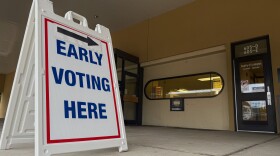-
What to know before you head to the polls on Tuesday.
-
House District 88 represents parts of South Congaree, Gaston and the town of Lexington. Voters have the opportunity to vote early on weekdays until 5 p.m. Oct. 17.
-
If voter participation trends from the last decade are any indication, only about half of all registered voters in SC will decide who will be placed in the Palmetto State’s highest executive seat.
-
Some voters find shorter lines as they cast ballots following record early voting across the state. Many say they're ready for this election to end.
-
On this episode of the South Carolina Lede for November 5, 2024: America votes! It is election day in America; we look at what some pastors from across the state preached from the pulpit on Sunday; we also look at which counties have sales tax referendums on the ballot; a look at what books may be banned from middle and high school classrooms this week; and more!
-
Polls are open from 7 a.m. to 7 p.m. on Election Day, Nov. 5.
-
On this episode of the South Carolina Lede for October 29, 2024: we hear more from State Election Commission Director Howard Knapp; the latest from S.C. teenagers who have been disenfranchised by the SCDMV that failed to register them to vote; a new poll on what S.C. voters think is most important this election; and more!
-
On this episode of the South Carolina Lede for October 26, 2024: we hear from the voters who have driven record early voting turnout this week and speak with State Election Commission Director Howard Knapp; S.C.’s two Republican senators were campaigning for former President Donald Trump this week as the former president was labeled a fascist by his former chief of staff; we have details on how you can join our live taping of the SC Lede on 10/30 in Columbia; and more!
-
On this episode of the South Carolina Lede for October 22, 2024: early voting has started in South Carolina and we hear from voters from around the state; we take look at election security with Victoria Hansen; we hear what Sen. Lindsey Graham had to say about Republicans voting for VP Kamala Harris on Meet the Press; and more!
-
On this episode of the South Carolina Lede for October 19, 2024: a look at the week on the campaign trail with insight and analysis from Rep. James Clyburn and SCGOP Chairman Drew McKissick; a look at the latest from the South Carolina Ports; details on how to join us for our live Lede taping on Oct. 30 in our Columbia studio; and more!

Play Live Radio
Next Up:
0:00
0:00
Available On Air Stations









